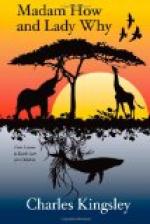Oh, the bridge is falling into the water!
Not a bit. You are not accustomed to see water running below you at ten miles an hour. Never mind that feeling. It will go off in a few seconds. Look; the water is full six feet up the trunks of the trees; over the grass and the king fern, and the tall purple loose-strife—
Oh! Here comes a tree dancing down!
And there are some turfs which have been cut on the mountain. And there is a really sad sight. Look what comes now.
One—two—three.
Why, they are sheep.
Yes. And a sad loss they will be to some poor fellow in the glen above.
And oh! Look at the pig turning round and round solemnly in the corner under the rock. Poor piggy! He ought to have been at home safe in his stye, and not wandering about the hills. And what are these coming now?
Butter firkins, I think. Yes. This is a great flood. It is well if there are no lives lost.
But is it not cruel of Madam How to make such floods?
Well—let us ask one of these men who are looking over the bridge.
Why, what does he say? I cannot understand one
word. Is he talking
Irish?
Irish-English at least: but what he said was, that it was a mighty fine flood entirely, praised be God; and would help on the potatoes and oats after the drought, and set the grass growing again on the mountains.
And what is he saying now?
That the river will be full of salmon and white trout after this.
What does he mean?
That under our feet now, if we could see through the muddy water, dozens of salmon and sea-trout are running up from the sea.
What! up this furious stream?
Yes. What would be death to you is pleasure and play to them. Up they are going, to spawn in the little brooks among the mountains; and all of them are the best of food, fattened on the herrings and sprats in the sea outside, Madam How’s free gift, which does not cost man a farthing, save the expense of nets and rods to catch them.
How can that be?
I will give you a bit of political economy. Suppose a pound of salmon is worth a shilling; and a pound of beef is worth a shilling likewise. Before we can eat the beef, it has cost perhaps tenpence to make that pound of beef out of turnips and grass and oil-cake; and so the country is only twopence a pound richer for it. But Mr. Salmon has made himself out of what he eats in the sea, and so has cost nothing; and the shilling a pound is all clear gain. There—you don’t quite understand that piece of political economy. Indeed, it is only in the last two or three years that older heads than yours have got to understand it, and have passed the wise new salmon laws, by which the rivers will be once more as rich with food as the land is, just as they were hundreds of years ago. But now, look again at the river. What do you think makes it so yellow and muddy?




